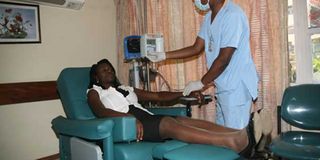How to manage common side effects of chemotherapy

Lawrence Gichini an Oncology nurse demonstrates how chemotherapy for cancer patients is administered at the Aga Khan Hospital. Life expectancy in Sub Saharan Africa fell by five years at a time when the global average increased by six years, a study released today shows. PHOTO | FILE
What you need to know:
- Some people may experience only a or none at all. The severity differs from person to person, depending on the dose and how the body reacts to treatment.
- Chemotherapy may cause certain lifelong side effects such as fertility problems, damage to nerves, and delayed growth in children.
Chemotherapy aims to kill cancer cells.
However, in the process of destroying these cells, it can damage healthy ones. It is this damage to healthy cells that causes side effects.
Some of the healthy cells at risk include those in the reproductive system, mouth, digestive tract, hair follicles, and blood-forming cells in the bone marrow. Other essential organs such as the kidneys, heart, and lungs may also be affected. It is, therefore, important to discuss with your doctor possible side effects before proceeding with treatment.
What you need to know about chemotherapy side effects
Some people may experience only a or none at all. The severity differs from person to person, depending on the dose and how the body reacts to treatment.
Chemotherapy may cause certain lifelong side effects such as fertility problems, damage to nerves, and delayed growth in children.
How to cope with general side effects:
Nausea and vomiting
Spread your meals throughout the day instead of taking the traditional three meals a day.
Meals should be at room temperature.
Avoid strong-smelling foods or sweet, fatty, and fried foods.
Avoid taking liquids with meals. Instead, rink an hour before or after taking your meal.
Dry cereal or crackers can take away nausea.
How to cope with fatigue
Rest a lot and only do what is important
Perform light exercises, such as short walks or doing light chores around the house.
Eat a well-balanced diet and take plenty of liquids.
If constipated, take plenty of liquids, especially water, to help loosen stool.
Talk to you doctor about increasing fibre intake since certain cancers and side effects may not allow a high-fibre diet.
Diarrhoea
Diarrhoea causes loss of fluids, therefore you need to drink plenty of fluid for replacement.
Water or clear soups are a good choice. Avoid high-fibre foods which can worsen diarrhoea.
Instead, take low-fibre foods such as noodles, white rice, ripe bananas, or mashed potatoes.
Also, avoid milk and milk products such as cheese and ice cream since they make diarrhoea worse. Also, eat potassium-rich foods such as potatoes, bananas, and oranges.
Mouth sores
Eat your meals at room temperature to avoid irritation in case your mouth and throat are tender. Avoid spicy, salty, and acidic foods too. Instead, eat soft foods such as mashed potatoes, puddings, and custards.
HAIR LOSS
Avoid perming, dying, or relaxing your hair. Use a soft brush and do not use brush rollers to set hair.
Use a mild shampoo and low heat to dry.
A shorter hair style will give your hair a fuller and thicker look. It also makes hair loss more manageable if it happens.
Infections
These are more likely to occur due to the effects of chemo on bone marrow, which interferes with the manufacture of white blood cells (WBCs), which are responsible for fighting infection. To help keep infection at bay:
Wash hands, especially after using bathroom and before eating.
Clean your rectal area thoroughly, but gently, every time you have a bowel movement.
Avoid crowded places and stay away from people with contagious illnesses such as measles, chicken pox, or flu.
Observe dental hygiene.
Avoid cutting yourself. If you do, clean the cut immediately and every day until it heals.
Avoid raw foods to minimise chances of food-related infections.
Report any signs of infection, such as sweating.




